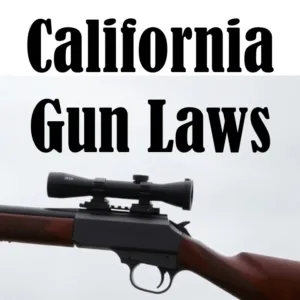California is known for having some of the strictest gun laws in the United States. With an emphasis on regulation, the state has comprehensive requirements surrounding firearm ownership, purchasing, carrying, and other restrictions. This guide provides a thorough overview of California’s gun laws, including licensing, concealed carry permits, firearm purchasing processes, restricted locations, and self-defense rights, to help you navigate these laws effectively.
California Gun Laws Overview

Gun Ownership and Registration Requirements
California requires all gun sales, including private transactions, to go through a licensed dealer and mandates firearm registration. This system ensures accountability and establishes a record of gun ownership to enhance safety. California’s gun laws apply to handguns, rifles, shotguns, and certain ammunition types.
- Minimum Age Requirement: Individuals must be at least 21 to purchase a handgun and 18 for a rifle or shotgun.
- Eligibility Requirements: To own or purchase firearms in California, you must not have a felony conviction, certain misdemeanor convictions, or be subject to a restraining order. Additionally, individuals with documented mental health issues may also be prohibited from gun ownership.
- Firearm Safety Certificate: Prospective gun owners must obtain a Firearm Safety Certificate (FSC) by passing a written test on gun safety laws and safe handling practices.
Purchasing a Firearm in California
California has specific requirements for purchasing firearms, including a background check and a 10-day waiting period. These measures are intended to ensure that gun buyers meet all eligibility requirements and have time to consider their purchase.
Key Requirements:
- Background Check: All firearm purchases require a background check, including private sales. Dealers are responsible for conducting these checks.
- Waiting Period: A 10-day waiting period applies to all gun purchases, during which the dealer holds the firearm before releasing it to the buyer.
- Assault Weapon Restrictions: California has banned the sale of certain assault-style weapons. Residents may only own or purchase state-approved firearms that meet specific criteria.
- Limit on Purchases: California limits the purchase of handguns to one per 30 days, except for private party transactions or certain exemptions.
Open Carry in California
California has strict open carry restrictions, generally prohibiting the open carry of firearms in public places. Exceptions exist only for specific individuals, such as law enforcement, and certain regions where open carry permits may be granted with significant restrictions.
Concealed Carry in California
California is a “may-issue” state for concealed carry permits, meaning that issuing authorities have discretion in granting permits based on perceived need. County sheriffs or city police chiefs are responsible for approving permits, and requirements may vary based on the local issuing authority.
How to Obtain a California Concealed Carry Weapon (CCW) Permit:
- Age and Residency: Applicants must be at least 21 years old and reside in the county where they apply.
- Training: Applicants must complete an approved firearm training course.
- Good Cause Requirement: Some issuing authorities may require applicants to demonstrate a specific, credible need for carrying a concealed weapon.
- Background Check and Approval: Applicants must pass a background check, complete the required forms, and pay fees.
Restricted Locations for Carrying Firearms in California
California restricts firearms in various public locations, even for permit holders. Individuals must familiarize themselves with these limitations to avoid legal penalties.
- Schools: Firearms are prohibited on K-12 school grounds, with exceptions for authorized personnel.
- Government Buildings: Guns are not allowed in government buildings, courthouses, and other secured locations unless specifically permitted.
- Private Property: Private property owners can restrict firearms on their premises and may post signs prohibiting weapons.
- Public Gatherings: California prohibits firearms at public gatherings, such as protests, parades, and political rallies.
- National and State Parks: Firearm laws in national and state parks follow federal guidelines, but visitors should verify any specific restrictions for each location.
Self-Defense Laws: Stand Your Ground and Castle Doctrine
California law allows individuals to use reasonable force, including deadly force if necessary, for self-defense in certain situations. However, California’s self-defense laws are nuanced, and individuals should understand the specific guidelines.
Stand Your Ground
California does not have a formal Stand Your Ground law, but case law supports the right to self-defense without a duty to retreat if you are in a place where you have a lawful right to be. This generally applies to instances where an individual is in imminent danger and reasonably believes force is necessary to prevent harm.
Castle Doctrine
Under California’s Castle Doctrine, residents are allowed to defend their home or occupied vehicle from an intruder without retreating. If an individual forcibly enters, the law assumes that residents have a reasonable fear of imminent danger, allowing them to use force to protect themselves and others in their home.
Restrictions on Firearms in California
California places additional restrictions on firearm ownership, particularly regarding specific firearms and firearm features that the state considers dangerous.
- Assault Weapons: California bans assault weapons and has specific criteria for firearms that may fall under this category based on features such as detachable magazines, pistol grips, and folding stocks.
- Magazine Capacity: California limits magazine capacity to 10 rounds for most firearms, with exceptions for law enforcement and certain grandfathered firearms.
- Prohibited Individuals: Persons convicted of certain violent misdemeanors, felons, and those with restraining orders related to violence or mental health issues cannot possess firearms in California.
Gun Law Penalties in California
Violating California’s gun laws can lead to severe penalties, including fines, jail time, and firearm forfeiture. Some common violations include:
- Carrying Without a Permit: Carrying a concealed firearm without a permit is illegal and can lead to misdemeanor or felony charges.
- Prohibited Firearm Features: Possessing an assault weapon or a firearm with banned features can result in felony charges.
- Unlawful Purchase or Transfer: Attempting to purchase a firearm without completing a background check or making a private sale without going through a licensed dealer can result in fines and other penalties.
Reciprocity with Other States
California does not recognize concealed carry permits from any other state. Therefore, out-of-state permit holders are not permitted to carry concealed weapons in California. Visitors should comply with all California firearm regulations to avoid legal issues.
Conclusion: Navigating California’s Gun Laws
California’s gun laws prioritize regulation, requiring background checks, permits for concealed carry, and restrictions on certain firearms and features. For residents and visitors alike, understanding these rules is essential to staying compliant and avoiding penalties. Due to the complexity of California’s firearm laws, many gun owners opt to consult legal professionals for guidance.
Whether purchasing a firearm, applying for a CCW permit, or transporting firearms, knowing California’s regulations is crucial for responsibly exercising your Second Amendment rights within the state.
FAQs About Gun Laws in California
1. Is open carry legal in California?
Generally, no. California prohibits the open carry of firearms, except in limited situations or areas with explicit permits.
2. How long is the waiting period for firearm purchases in California?
There is a mandatory 10-day waiting period for all firearm purchases, including rifles, shotguns, and handguns.
3. Can I buy an assault weapon in California?
No, California has banned the sale of certain assault-style weapons. Only firearms meeting specific state criteria are permitted.
4. Does California recognize out-of-state concealed carry permits?
No, California does not recognize concealed carry permits issued by other states. Out-of-state permit holders must comply with California’s laws.
5. What are the penalties for violating California’s gun laws?
Penalties vary depending on the violation but may include fines, jail time, and firearm confiscation.
